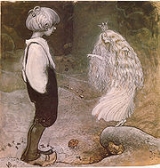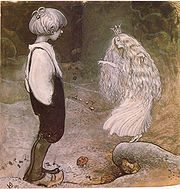
Wish
Encyclopedia

Plot device
A plot device is an object or character in a story whose sole purpose is to advance the plot of the story, or alternatively to overcome some difficulty in the plot....
s. In folklore, opportunities for "making a wish" or for wishes to "come true" or "be granted" are themes that are sometimes used.
In literature
In fictionFiction
Fiction is the form of any narrative or informative work that deals, in part or in whole, with information or events that are not factual, but rather, imaginary—that is, invented by the author. Although fiction describes a major branch of literary work, it may also refer to theatrical,...
a wish is a supernatural
Supernatural
The supernatural or is that which is not subject to the laws of nature, or more figuratively, that which is said to exist above and beyond nature...
demand placed on the recipient's unlimited request. When it is the center of a tale, the wish is usually a template for a morality tale, "be careful what you wish for"; it can also be a small part of a tale, in which case it is often used as a plot device
Plot device
A plot device is an object or character in a story whose sole purpose is to advance the plot of the story, or alternatively to overcome some difficulty in the plot....
. You can wish on many things for example: wishing wells, dandelions when you blow the seeds, stars and much more. When you wish in a well you throw money in, in the hope your wish comes true, the money normally goes to a charity.
A template for fictional wishes could be The Book of One Thousand and One Nights
The Book of One Thousand and One Nights
One Thousand and One Nights is a collection of Middle Eastern and South Asian stories and folk tales compiled in Arabic during the Islamic Golden Age...
, specifically the tale of Aladdin
Aladdin
Aladdin is a Middle Eastern folk tale. It is one of the tales in The Book of One Thousand and One Nights , and one of the most famous, although it was actually added to the collection by Antoine Galland ....
, although in the tale of Aladdin the actual wishes were only part of the tale. Also, Aladdin's demands, while outrageous, were mainly variations on wealth (which is still often taken as the most common request).
Classically the wish provider is often a spirit, Genie
Genie
Jinn or genies are supernatural creatures in Arab folklore and Islamic teachings that occupy a parallel world to that of mankind. Together, jinn, humans and angels make up the three sentient creations of Allah. Religious sources say barely anything about them; however, the Qur'an mentions that...
or similar entity, bound or constrained within a commonplace object (Aladdin's oil lamp
Oil lamp
An oil lamp is an object used to produce light continuously for a period of time using an oil-based fuel source. The use of oil lamps began thousands of years ago and is continued to this day....
for example) or a container closed with Solomon
Solomon
Solomon , according to the Book of Kings and the Book of Chronicles, a King of Israel and according to the Talmud one of the 48 prophets, is identified as the son of David, also called Jedidiah in 2 Samuel 12:25, and is described as the third king of the United Monarchy, and the final king before...
's seal. Releasing the entity from its constraint, usually by some simple action, allows the object's possessor to make a wish.
The subservience of the extraordinarily powerful entity to the wisher can be explained in several ways. The entity may be grateful to be free of its constraint and the wish is a thank-you gift. The entity may be bound to obedience by its prison or some other item that the wisher possesses. The entity may, by its nature, be unable to exercise its powers without an initiator.
Other wish providers are a wide variety of, more or less, inanimate objects. W.W. Jacob's Monkey's Paw
The Monkey's Paw
"The Monkey's Paw" is a horror short story by author W. W. Jacobs. It was published in England in 1902.The story is based on the famous "setup" in which three wishes are granted. In the story, the paw of a dead monkey is a talisman that grants its possessor three wishes, but the wishes come with an...
is an example of this. Piers
Anthony puts a spin on this idea in Castle Roogna: a magic ring claims to grant wishes and then claims credit when a wish comes true, apparently from
the unaided efforts of the characters—but every wish made on the ring sooner or later comes true.
Some wishes appear to be granted by nothing in particular. Snow White
Snow White
"Snow White" is a fairy tale known from many countries in Europe, the best known version being the German one collected by the Brothers Grimm...
's mother's wish for a beautiful child might have been a coincidence, but the father's wish in The
Seven Ravens transforms his sons into ravens, just as the mother's wish in The Raven
The Raven (Brothers Grimm)
"The Raven" is a fairy tale collected by the Brothers Grimm, number 93 in their collections.It is Aarne-Thompson type 401, the girl transformed into an animal.-Synopsis:...
transforms her
daughter. This is common in a tale involving a person, male or female, wishing for a child, even one that is a hedgehog
Hans My Hedgehog
Hans My Hedgehog, or Hans the Hedgehog, is a Brothers Grimm fairy tale collected by the Brothers Grimm. Since the second edition published in 1819, it has been recorded as Tale no...
, or a sprig of myrtle, or no bigger than a hazel nut
The Hazel-nut Child
The Hazel-nut Child is a Bukowinaer fairy tale collected by Dr Heinrich von Wlislocki in Märchen Und Sagen Der Bukowinaer Und Siebenbûrger Armenier. Andrew Lang included it in The Yellow Fairy Book....
.
The number of wishes granted varies. Aladdin had an unlimited number. As in the Charles Perrault
Charles Perrault
Charles Perrault was a French author who laid the foundations for a new literary genre, the fairy tale, with his works derived from pre-existing folk tales. The best known include Le Petit Chaperon rouge , Cendrillon , Le Chat Botté and La Barbe bleue...
tale The Ridiculous Wishes
The Ridiculous Wishes
The Ridiculous Wishes or The Three Ridiculous Wishes is a French literary fairy tale by Charles Perrault. It is Aarne-Thompson type 750A.-Synopsis:...
, three is the most
common, but
others may be granted to fit the constraints of the tale. Several authors have spun variations of the wish for more wishes theme, though some disallow this as
cheating.
In many stories the wording of the wish is extremely important. For example, characters often say, "I wish I was wealthy." This wording could be taken
literally, the wish granted so that at one time the wisher was (used to be) wealthy but is not any more. Saying, "I wish to be wealthy", then because "to be"
refers to either the present or the future, they would become wealthy.
A common problem is the granter of the wish being either extremely literal
Quibble (plot device)
In literature, a quibble is a common plot device, used to fulfill the exact verbal conditions of an agreement in order to avoid the intended meaning. Its most common uses are in legal bargains and, in fantasy, magically enforced ones....
or through malice granting the request in a manner designed to cause maximum distress (such as a request for wealth being granted through inheritance/insurance on the death of a loved one). Certain authors have also tried an "always on" approach: the careless use of the word "wish" in everyday conversation having, often unpleasant, consequences.
In practice
Some cultures have customs in which people are encouraged to "make a wish", such as blowing out the candles on a birthday cakeBirthday cake
The birthday cake has been an integral part of the birthday celebrations in Western cultures since the middle of the 19th century. Certain rituals and traditions, such as singing of birthday songs, associated with birthday cakes are common to many Western cultures. The Western tradition of adding...
, seeing a
shooting star
Meteoroid
A meteoroid is a sand- to boulder-sized particle of debris in the Solar System. The visible path of a meteoroid that enters Earth's atmosphere is called a meteor, or colloquially a shooting star or falling star. If a meteoroid reaches the ground and survives impact, then it is called a meteorite...
at night, tossing a coin into a wishing well
Wishing well
A wishing well is a term from European folklore to describe wells where it was thought that any spoken wish would be granted. The idea that a wish would be granted came from the idea that water housed deities or had been placed there as a gift from the gods, since water was a source of life and...
or fountain
Fountain
A fountain is a piece of architecture which pours water into a basin or jets it into the air either to supply drinking water or for decorative or dramatic effect....
or breaking the wishbone
Wishbone
Wishbone may refer to:* The wishbone, a Y-shaped bone found in birds* Wishbone suspension, an automobile suspension design.* Wishbone , an children's educational television show...
of a cooked turkey
Turkey (bird)
A turkey is a large bird in the genus Meleagris. One species, Meleagris gallopavo, commonly known as the Wild Turkey, is native to the forests of North America. The domestic turkey is a descendant of this species...
. Many believe such wishes can only come true if they are kept a secret from other people. Others, on the other hand, believe that wishes come true only if they are told to someone else.
See also
- Make-A-Wish FoundationMake-A-Wish FoundationThe Make-A-Wish Foundation is a 501 non-profit organization founded in the United States that grants wishes to children who have life-threatening medical conditions. The charity now operates in forty-seven countries around the world through thirty-six affiliate offices.The president & CEO of this...
- Kids wish networkKids Wish NetworkKids Wish Network is a 501 non-profit organization that grants wishes to children with life-threatening medical conditions.The charity was founded in 1997 by Shelley and Mark Breiner after the loss of Shelley's father to cancer, and was inspired by the many youth cancer patients Shelley met during...
- Three wishes jokeThree wishes jokeThe three wishes joke is a form of joke in which the protagonist is given three wishes by a supernatural being, and fails to make the best use of them...
- Wishful thinkingWishful thinkingWishful thinking is the formation of beliefs and making decisions according to what might be pleasing to imagine instead of by appealing to evidence, rationality or reality...

